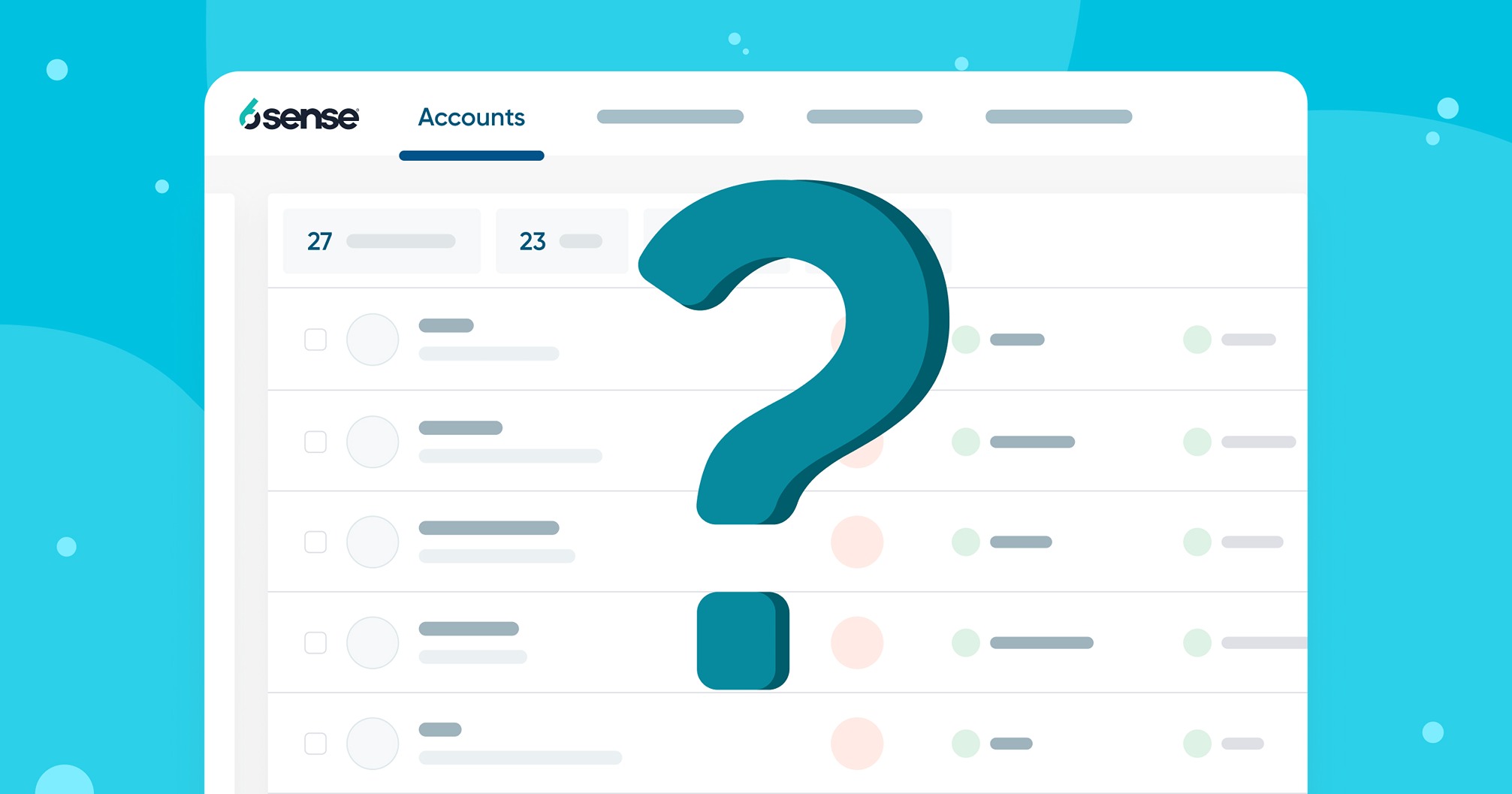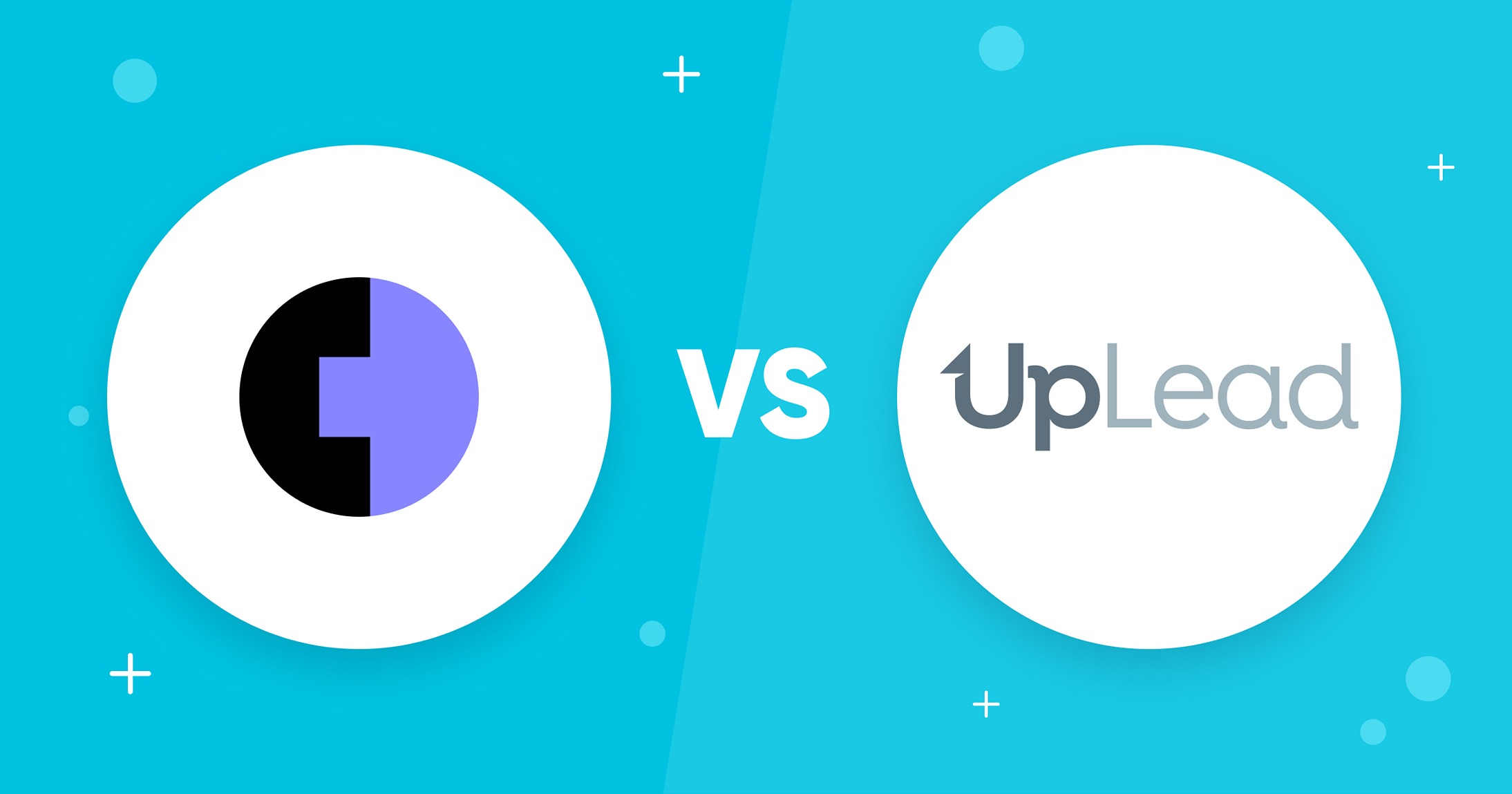Deciding between Cognism and ZoomInfo, two robust sales intelligence platforms promising qualified leads and improved outreach, requires understanding key distinctions. While both integrate contact data into existing CRMs and support targeted B2B prospecting, each takes a different approach regarding priorities and capabilities.
This article compares offerings across critical categories – data accuracy, key features, integrations, ease of use, compliance, pricing, and more – to provide actionable intelligence on which solution best aligns with your sales acceleration needs and constraints. By the end, you will gain clarity to determine if Cognism or ZoomInfo is the right long-term fit for your growth goals.
What is Cognism?
Cognism is a global market intelligence platform providing premium business data to enhance B2B sales and marketing efforts. The platform offers access to verified business emails, phone-verified mobile numbers, and buyer intent data, signaling when prospects are ready to purchase. This helps users target relevant decision-makers, shortening the sales cycle and improving success rates.
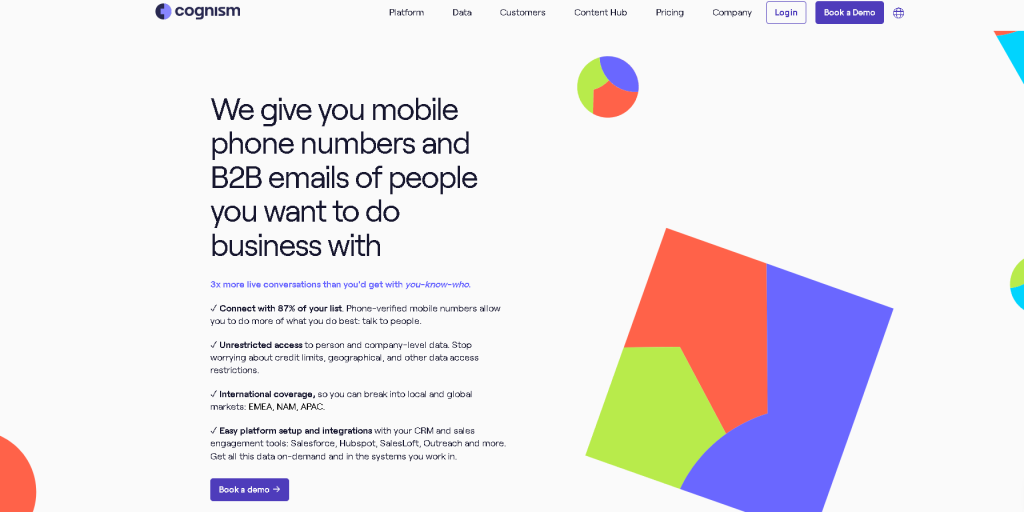
Distinguished by its commitment to data accuracy and compliance, Cognism refines the crucial prospect data sales teams need. It supports targeted list building, lead enrichment, and other use cases for customers of EMEA, US, and DACH regions. Cognism’s offerings aim to reduce lead response times, connect with more prospects, and pinpoint the best revenue opportunities by providing quality intelligence. Users consistently report improvements in meeting booking and revenue influenced by Cognism leads.
What is ZoomInfo?
ZoomInfo is a robust B2B database platform providing sales and marketing teams with the data and tools to identify, connect, and engage with qualified prospects. Key capabilities include lead building, CRM integration, data management, segmentation, alerts, and more to increase efficiency and align efforts. Beyond basic contact data, ZoomInfo offers intent signals, understanding prospect behavior, market intelligence, workflows, and website visitor insights. Integrations with various CRM and marketing automation systems also enhance ZoomInfo’s utility.
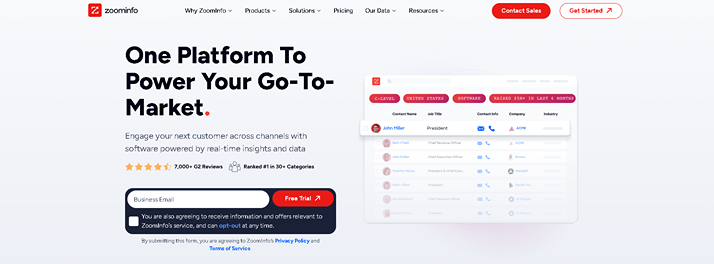
Businesses use ZoomInfo for improved lead generation, shorter sales cycles, higher conversion rates, and driving revenue growth. Additional features like Engage, Intent, and Chorus empower users to capture engagement opportunities and close more deals. As a critical component of many outbound sales strategies, ZoomInfo provides actionable intelligence to help achieve growth objectives.
Main Differences Between ZoomInfo and Cognism
Regarding data quality and coverage, Cognism prides itself on comprehensive EMEA region data, industry-leading US mobile coverage, and phone numbers for high accuracy. Its 16-step email verification process also underscores a commitment to quality data. ZoomInfo alternatively offers expansive global insights into companies and employees but requires a costly ‘Global Data Passport’ for international prospecting.
In terms of features, ZoomInfo provides a suite of sales, marketing, and talent management tools integrated into its SalesOS, MarketingOS, and TalentOS platforms – including engagement apps, advertising management, website chat, intent signals, and more. Cognism focuses on sales acceleration with AI-powered intelligence, targeted cadence automation, and intent tracking to identify high-value prospects. While ZoomInfo appeals to those wanting an all-in-one solution, Cognism caters to those prioritizing sales acceleration and verified data integrity.
Finally, user satisfaction ratings on G2 show Cognism with a score of 4.6/5, slightly higher than ZoomInfo’s 4.4/5, indicating a slight user experience advantage. Cognism receives consistent praise for its easy-to-use interface, data accuracy, and service, while some ZoomInfo users report data and customer service issues despite appreciating functionality.
Key Features of Cognism vs ZoomInfo
Cognism and ZoomInfo offer robust capabilities for lead generation and sales prospecting, though with differing priorities. A key point of differentiation is in ZoomInfo’s expansive global data coverage, whereas Cognism concentrates more narrowly on verified business contacts within target EMEA and US regions. This shapes the relative focus of each platform’s capabilities and ideal use cases.
Cognism Features
Cognism emphasizes high-quality, compliant data, which is especially strong in the EMEA and US regions. Key features include:
- Phone-Verified Mobile Numbers: Unlike many competitors, Cognism phone numbers are verified against do-not-call lists for quality assurance.
- Advanced Sales Intelligence: Cognism provides firmographic, technographic, and buyer intent signals to understand buyers and target outreach accordingly.
- Sales Prospector Tool: Users can generate targeted leads matching their ideal customer profile using various filters to find the proper emails and contacts.
- Intent Data: Actionable insights on prospects ready to buy allow users to prioritize and time outreach for greater effectiveness.
- CRM/Sales Engagement Integrations: Integration with popular platforms streamlines processes.
ZoomInfo Features
ZoomInfo is known for its vast database and target market intelligence capabilities. Notable features include:
- Extensive B2B Database: A robust database of company and employee insights assists with targeted prospect email list creation.
- Market Intelligence: Trend analysis and buying signals allow users to adjust prospecting strategies.
- Automated Workflows: Tools to automate parts of the lead generation process increase efficiency.
- CRM/Marketing Integrations: Like Cognism, ZoomInfo integrates with other marketing/sales tech platforms.
- Engagement Tools: Website chat and forms help users directly engage and capture more leads.
When comparing the platforms, Cognism phone-verifies its contact data, which direct outreach-focused users may find more valuable. At the same time, ZoomInfo offers greater global reach, albeit with potential extra costs for full international data access. Both utilize intent data signals, but Cognism emphasizes leveraging these insights to prioritize prospects demonstrating purchase readiness when timing sales outreach for optimal effectiveness.
Ultimately, Cognism provides verified regional contacts setting aside ready-to-act opportunities. In contrast, ZoomInfo delivers breadth, lacking the rigorous direct contact validation that could bolster outreach confidence despite wider market perspectives needing financial tradeoffs.
Still, to unlock full international data access, ZoomInfo users may need to upgrade to premium packages or purchase add-on packs at an extra cost, depending on geographic needs. So, while breadth of coverage is a strength, tapping into complete global contacts requires greater financial investment, a potential limitation for pure-play international organizations. Beyond contact scale differences, ZoomInfo users gain helpful market intelligence through trend reports and intent signals to adjust strategies. Comparatively, Cognism hones in on identifying the most favorable current opportunities, leveraging insights to prioritize outreach to prospects exhibiting clear buying indicators specifically. This positions users to capitalize on ready sales conversations.
Data Quality & Coverage
In the realm of sales intelligence, the quality and coverage of data are paramount. Cognism and ZoomInfo provide extensive databases for B2B prospecting, but they source and maintain their data differently, affecting their reliability, accuracy, and coverage.
Cognism’s Data
Cognism sources its data from public and proprietary sources, including global data partners, to ensure comprehensive coverage and compliance with data protection regulations like GDPR. The platform is particularly known for its:
- Data Reliability/Accuracy: Cognism’s standout feature is its phone-verified mobile numbers, regularly checked against global do-not-call lists. This and a 16-step email verification process underscores its commitment to data accuracy and compliance.
- Coverage: Cognism provides verified business emails, phone-verified mobile numbers, and intent data. Its coverage is especially strong in the EMEA region and the US, focusing on providing actionable data for sales teams, including firmographics and technographics.
ZoomInfo’s Data
ZoomInfo gathers its data through various means, including web crawling, data partnerships, and machine learning, to maintain a vast and detailed database. Its data offerings include:
- Data Reliability/Accuracy: While ZoomInfo offers a large volume of data, there have been some user reports of inaccuracies. However, the platform employs machine learning and a dedicated team to update and verify data to maintain its reliability continuously.
- Coverage: ZoomInfo’s database includes emails, direct dials, mobile numbers, and buyer intent signals. It has a global reach, providing insights into various industries and markets. However, accessing international data may require additional services like the ‘Global Data Passport.’
Cognism and ZoomInfo use public information, proprietary methods, and partnerships to source data, but Cognism uniquely phone-verifies contacts for superior accuracy and confidence, which are crucial in direct outreach. Through rigorous verification processes, Cognism may achieve higher overall data integrity, especially phone numbers, contrasting ZoomInfo’s reliance on high-volume information subject to inaccuracies.
Regarding coverage, Cognism drives towards verified contacts in target EMEA and US regions, while ZoomInfo offers wider global breadth – albeit likely necessitating additional purchase costs to access comprehensive international data. Ultimately, Cognism appeals to those needing compliance and precise, valid contacts, whereas ZoomInfo suits exploratory prospecting given immense data volume and global reach despite potential precision and pricing tradeoffs.
Cognism vs ZoomInfo Integrations
Cognism and ZoomInfo integrate with major platforms like Salesforce and HubSpot to sync verified, up-to-date data into CRMs and marketing tools. Streamlining workflows and eliminating manual entry, these integrations are essential for optimizing outreach.
Cognism Integrations
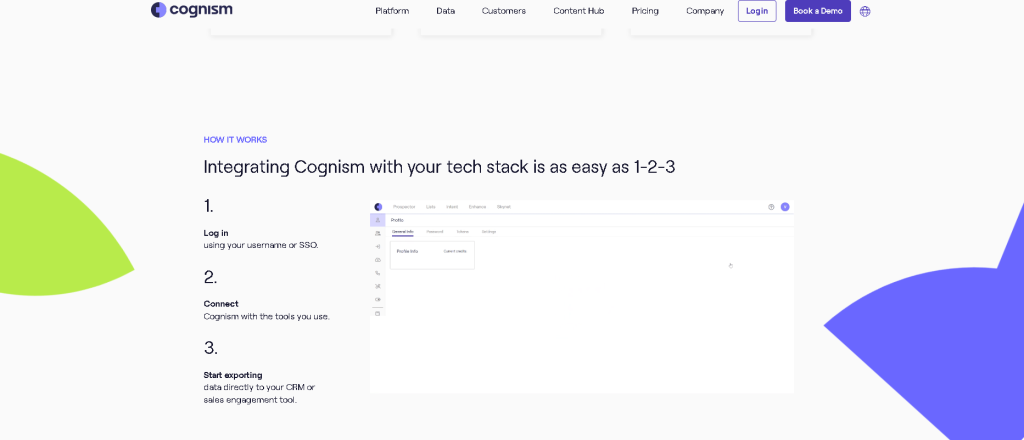
Cognism offers direct integration with:
- Salesforce: Seamlessly exports account and contact data to support sales automation and workflows.
- Outreach: Adds prospects into sequences for efficient cadence management.
- HubSpot: Syncs contact data for inbound marketing and sales alignment.
- Chrome Extension – Retrieves LinkedIn contact data to sync with HubSpot and other CRMs.
- Zapier: Connects with thousands of other apps to eliminate tedious tasks.
Cognism’s seamless integrations aim to fuel compliant, high-confidence outreach by propagating verified contacts into sequences and CRMs. The Outreach connector aligns qualified leads with cadence messaging to convert ready opportunities. And the Cognism Chrome extension captures social profiles on-demand to swiftly add to targeted account lists, enriching data integrity.
ZoomInfo Integrations
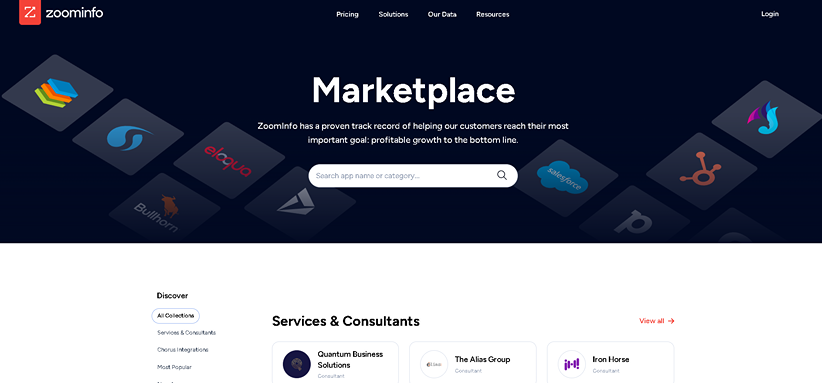
ZoomInfo also connects with top platforms:
- Salesforce – Exports data to CRM for enhanced lead management.
- HubSpot – Enriches marketing campaigns with database intelligence.
- Google Analytics 360 – Ties marketing performance to website analytics.
- Slack – Manages sales team communication and workflow.
- Zoho CRM – Eliminates company research time, providing in-depth lead intelligence.
- Chrome Extension – Enables quick prospect research and outreach from the browser.
Comparatively, ZoomInfo connects systems to harness raw intelligence for campaign and performance optimization. Tying web analytics provides unique visibility into how database segments interact with assets. Ingesting ZoomInfo’s expansive firmographic details into CRM builds more comprehensive account records to inform strategy. Still, some manual review may be advisable, given potential inconsistencies in global contacts. However, productivity accelerators like the Chrome extension and Slack bot aid research and team orchestration around high value prospects.
Standout capabilities include CRM integrations for both platforms for comprehensive, up-to-date data syncing to maximize outreach. The Chrome extensions also simplify capturing prospect details. ZoomInfo’s Google Analytics 360 integration uniquely aligns campaign efforts to web traffic and conversions. Cognism’s GDPR-compliant, phone-verified data may better serve users with strict data regulations. And its Outreach integration is specialized for improving sales sequences.
Ease of Use
Both platforms aim to simplify lead generation, but their approaches to usability differ. Cognism focuses on an intuitive, no-frills interface for easy adoption, while ZoomInfo’s more expansive capabilities lead to more complexity.
Cognism Usability
Cognism earns consistent praise for its clean, user-friendly interface that makes finding and exporting leads straightforward for all users. Implementation is also simple, thanks to seamless CRM integrations like Salesforce and HubSpot. Minimal training is required to get started due to the platform’s intuitive navigation.
ZoomInfo Usability
ZoomInfo also sports an intuitive interface catering to sales and marketing teams with robust search and filtering for quick lead identification. However, implementation can be more complicated given the platform’s vast feature set and seamless integrations, often demanding extensive onboarding and training to leverage capabilities fully. However, ZoomInfo provides expansive training resources and support.
Cognism’s simplicity does not sacrifice function, appealing to those wanting quick deployment and minimal ramp-up time. In contrast, ZoomInfo’s broader capabilities lead to more initial complexity and greater long-term versatility. So, the choice ultimately depends on an organization’s immediate usability needs versus available resources for more advanced platform adoption.
Security & Compliance
Cognism and ZoomInfo implement robust security and compliance frameworks to protect customer data privacy. They hold ISO 27001 and 27701 certifications but approach GDPR and CCPA adherence differently.
Cognism Compliance
Cognism is renowned for its data privacy and compliance, especially regarding international regulations like GDPR and CCPA. Measures include:
ISO 27001 and ISO 27701 Certifications – Demonstrates systematic sensitive data management.
- SOC2 Type II Attestation – Ensures data security, availability, and privacy.
- GDPR Compliance – Notifies database, verifies business emails, scrubs mobile numbers against Do-Not-Call registries.
- CCPA Compliance – Provides external privacy notices that are aligned with CCPA.
Cognism’s GDPR specificity underscores its laser focus on delivering contact data, upholding the most stringent regulatory guardrails to enable confident outreach. Rigorous checks against Do-Not-Contact registries ensure that records not only align with policy but represent actively receptive prospects. This caters to users navigating complex cross-border sales settings or highly regulated sectors needing to demonstrate diligence.
ZoomInfo Compliance
ZoomInfo employs a security-first methodology with certifications including:
- ISO 27001, ISO 27701, SOC2 Type II – Underscores commitment to data security/privacy.
- GDPR & CCPA Validations – Showcases adherence to data practices through audits.
- Risk Management Framework – Assesses and minimizes information security risks.
Both achieve critical ISO certifications and have frameworks protecting data. Cognism’s specific GDPR compliance stands out with proactive steps like database notification and DNC registry scrubs. ZoomInfo instead has GDPR/CCPA validations from audits proving program robustness.
Cognism’s granular GDPR address highlights the concentration on accurate and compliant data. ZoomInfo’s independent evaluations showcase an ongoing commitment to the highest privacy and security standards through certifications.
Plans & Pricing: Cognism vs ZoomInfo
Neither Cognism nor ZoomInfo publicly lists specific pricing; instead, they emphasize customized packages based on individual client needs and use cases. Both highlight flexibility and tailored solutions addressing unique business requirements.
Cognism Plans
Rather than predefined tiers, Cognism focuses on personalization and flexibility. Offerings are tuned around factors like:
- Phone Verification On-Demand
- List Building Web App
- CSV Enrichment Credits
- Individual Prospecting Browser Extensions
- CRM Integrations
This emphasis on addressing specific workflows and challenges indicates an advisor-like approach to pricing. UpLead is a solid and affordable Cognism alternative with transparent pricing.
ZoomInfo Plans
ZoomInfo’s pricing plans start at $14,995 per year for the Professional plan, which includes 5,000 credits and allows up to 3 users. There are three main pricing plans available, each offering different levels of access and features:
- Professional Plan: $14,995 annually, providing 5,000 annual bulk credits and additional users at $1,500 each.
- Advanced Plan: $24,995 per year, offering 10,000 annual bulk credits and 1,000 monthly user credits, with user fees at $2,500.
- Elite Plan: $39,995 annually, including 10,000 annual bulk credits and 1,000 monthly credits per user, with the same user fees as the Advanced plan.
In essence, both platforms avoid publicly listing pricing, instead promoting flexibility. Cognism seems to take an advisor-like approach, directly tackling unique customer pain points. ZoomInfo offers tailored bundles based on functional sales, marketing, and HR roles. However, both focus on customization over predefined tiers to address specific needs. Potential customers must engage reps for exact pricing details.
Pros and Cons of Cognism vs ZoomInfo
Both platforms aim to enhance B2B sales and marketing but have distinct strengths and limitations.
Cognism Pros and Cons
Cognism delivers compliant, accurate contact data focused on EMEA and US regions despite limited transparency and global reach.
Pros:
- Phone-Verified Data – Ensures accuracy and regulatory compliance
- GDPR/CCPA Compliance – Prioritizes data privacy
- Intent Data – Identifies sales-ready prospects
- Intuitive Interface – Simplifies exporting lead data
- EMEA/US Coverage – Provides verified regional contacts
Cons:
- Transparent Pricing – Packages not publicly listed
- Global Reach – More limited outside target EMEA/US regions
ZoomInfo Pros and Cons
ZoomInfo provides vast data and intelligence across a robust platform, though its comprehensive capabilities come with more complexity and some inconsistencies.
Pros:
- Vast Database – Extensive global company and contact data
- Market Intelligence – Actionable insights into trends and signals
- Robust Integrations – Interoperability with sales/marketing stacks
- Engagement Tools – Built-in features like website chat to capture leads
- Comprehensive Capabilities – End-to-end platform meeting range of needs
Cons:
- Intent Data Accuracy – Some inconsistencies reported
- Complexity – Potentially steep learning curve
Cognism delivers verified, compliant data, while ZoomInfo provides breadth and versatility. However, both have transparency and capability gaps that need to be considered.
Which is Better: Cognism or ZoomInfo?
The choice between the two sales intelligence platforms depends mainly on an organization’s priorities regarding budget, regional needs, intent data needs, and platform requirements.
Choose Cognism For Verified Contacts, Compliance, and Sales Focus
Cognism is better for businesses requiring phone-verified data accuracy and strict regulatory compliance like GDPR/CCPA. Its guarantee of real business contacts aids outreach confidence. Tailored SEM/EMEA strength also suits those targeting European data. The UI simplicity and sales intelligence tools work best for sales teams wanting an intuitive platform to enhance critical prospecting without advanced bells and whistles. Smaller budgets can leverage Cognism’s essentials at a lower price point than all-in-one competitors.
Choose ZoomInfo For Comprehensive Intelligence and End-to-End Sales Stack
Conversely, ZoomInfo is ideal for larger enterprises needing an all-encompassing fit-for-purpose stack integrating sales intelligence, engagement, and analytics. Its unparalleled data breadth aids exploratory prospecting across functions, industries, and regions. Competitively priced packages cater to use-case-specific needs across sales, marketing, recruiting, and more, with associated tools baked in – avoiding the overheads of piecing together multiple-point solutions. ZoomInfo provides an efficient consolidated sales and marketing command center for global businesses and complex teams to operationalize intent data into decisive action.
Neither Tool the Right Fit? Try UpLead Instead
If Cognism and ZoomInfo fall short of meeting your needs, UpLead emerges as a compelling single-source alternative combining the best of both tools. UpLead matches ZoomInfo’s focus on delivering actionable intelligence to fuel business growth. Meanwhile, UpLead makes robust data accessibility straightforward for virtually any organization.
Specifically, UpLead stands out for its:
- 95% contact data accuracy guaranteed
- Cost-effectiveness to aid customer acquisition
- Real-time data verification ensuring optimal accuracy
- Ease of use from onboarding to everyday function
- 6000+ integrations via Zapier aligning with any tech stack
By blending affordable, high-quality intent data and insights with a user-friendly and versatile platform, UpLead empowers pre and post-revenue sales and marketing teams to execute differentiated sales and marketing strategies. To experience the platform’s full capabilities firsthand, take advantage of UpLead’s free trial.
What You Need to Remember About Cognism vs ZoomInfo
Weighing Cognism against ZoomInfo comes down to your budget, regional requirements, and desired balance of essentials versus advanced capabilities. Cognism wins on verified intent data and compliance, while ZoomInfo takes breadth and versatility. If neither fully meets expectations, explore UpLead as an affordable blend of quality intelligence and ease of use.
Ultimately, the “right” platform depends on internal resource realities alongside growth ambitions. Armed with this comprehensive comparison, you now have the insights to evaluate alignment confidently and build data-driven sales and marketing strategies tailored to your situation with your chosen partner.

